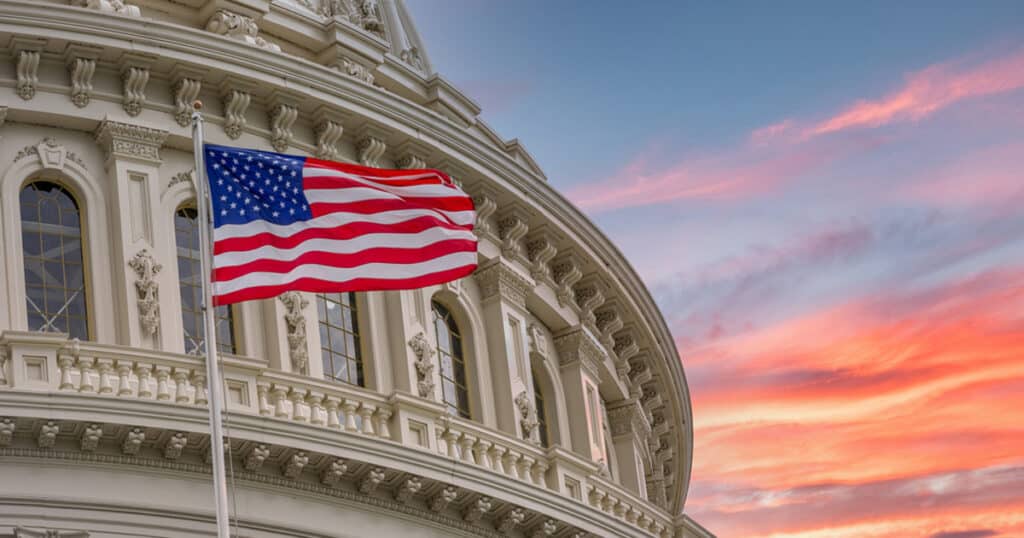
Can the House’s ‘Big, Beautiful Bill’ Survive Senate’s Changes?
After its passage by narrowest of margins in the House of Representatives, Republicans’ “big, beautiful” budget reconciliation bill is facing the prospect of major changes in the Senate, which could make it extremely difficult to pass when the revised bill is returned to the House.
The bill passed the House by a 215-214 margin with one “present” vote after last-minute deals were made to appease fiscal hawks and blue-state Republicans who demanded higher state tax deductions.
It would fulfill a number of President Donald Trump’s campaign promises, such as funding border security and extending his first-term 2017 tax cuts.
Rep. Chip Roy, R-Texas, who voted for the bill after last-minute talks with House leadership and the president, warned Wednesday that the bill would be dead in the water if the Senate made it less fiscally conservative.
“If this bill backslides, if they back off of what we got, which I don’t even think is necessarily good enough, I can promise you I will oppose it in the House,” he said.
Are GOP Senators Considering House’s ‘Red Lines’?
But some in the Senate suggest they will do the opposite and deliver even more spending cuts than the House.
Asked by The Daily Signal if he worried about vote margins in the House if cost-saving provisions are removed, Sen. Lindsey Graham, R-S.C., replied, “I think the Senate making the bill more fiscally responsible will actually help with the House.”
Sen. Thom Tillis, R-N.C., scoffed at the idea of “red lines” that can’t be crossed.
“Look, I’ve seen a lot of red lines erased and redrawn in the House. What we need to do is convince the president we have a solid bill, and they can have that discussion with the president if we get his support for what we’re going to send to the House. That’s how this place works, no sense in sugarcoating it,” he told The Daily Signal.
“The bottom line is, we’ve got to get this bill done. People can talk about it, but at the end of the day, you’re going to have a vote on the floor, and we’ll see how red that line is.”
Tillis did say, however, that House fiscal hawks might be won over with rescissions packages—a type of bill exempt from the Senate filibuster, which allows for cutting spending through a simple majority vote, rather than a 60-vote supermajority.
The White House recently delivered $9.4 billion in recommended cuts to the House, but Tillis says he would like to see “tens of billions in rescissions, based on work the DOGE have done.” DOGE is the Department of Government Efficiency.
“I think that will address some of the concerns of the House real fast. I mean, quite honestly, I want more cuts out of the Senate than they delivered in the House.”
The Food Stamp Issue
There are many cost-saving provisions in the House bill that are coming under scrutiny by Republican Senators.
One such issue is the way the bill finds saving in the Supplemental Nutrition Assistance Program (SNAP) by requiring states to share more of the cost of food stamps.
Sen. Tommy Tuberville, R-Ala., told The Daily Signal he’s worried Alabama won’t be able to afford that.
“I’m one of those 11 states that most of our budget is taken up by Medicaid. If we have to start spending $100 [million], $200 million on SNAP, we got problems,” he said.
But Tuberville is mindful of the razor-thin margin in the House, where eliminating such a provision could jeopardize the bill’s passage. He clarified that he wants to see the overall program reduced.
“What I want to do is see it reformed to where we don’t have as many people on SNAP. It’s not supposed to be a full-time entitlement program. And what’s going to happen is, all the blue states are going to have all these full-time people on it, and people in the Southern states are going to pay for it. So, we need to make it fair,” said Tuberville, who has announced his intention to run for Alabama governor next year.
Of course, Democrats revile the idea of states sharing a higher cost-burden from SNAP.
It will be “devastating on the program, devastating on the states and definitely devastating on the needs of everyday Americans,” Sen. Peter Welch, D-Vt., a member of the Senate Committee on Agriculture told The Daily Signal when asked about states sharing higher SNAP costs with the federal government.
Sen. Tillis’ Objections
Tillis is a prime example of a Republican who would like to see major changes to the bill, many of which would anger House budget hawks and other groups.
He supports slower expiration dates for Biden-era green energy tax credits, for one thing.
But Roy has already said that moving back the early expiration dates that he pushed for would hurt a bill that is “on the edge of whether it’s good enough to merit moving forward.”
Tillis also said Medicaid reforms can’t be too severe, since the president “doesn’t want to harm qualified beneficiaries on any of the safety net programs.”
But if Tillis is opposed to spending cuts carried out that way, how can he claim to want more savings than the House?
“Everyone uses [waste, fraud and abuse] as a tagline, very few people know how to [get rid of] it. I did it for a living as a partner at PriceWaterhouse,” he told The Daily Signal, referring to the giant accounting and consulting firm.
“There are enormous savings to be had if we create programs and we provide people technology and infrastructure to do it. If you just do nothing more than leverage the analytics programs that CMS has, and you get a good program office in there, you can very quickly drive out savings,” he said, referring to the Centers for Medicare and Medicaid Services.
But Tillis has still more ideas on reconciliation that are likely to irk other factions, even those who are outside of the budget hawk faction of the House.
For one, he opposes the $40,000 cap on state and local tax (SALT) deductions—a policy mostly benefiting residents of high-tax blue states, who can then deduct local taxes on their federal tax returns.
House leadership’s SALT deal was an extremely contentious process that allowed the bill to just barely squeak through in the lower chamber. Four New York Republican representatives—enough to tank the bill—previously said they wouldn’t vote for a bill if the cap was set at $30,000. It’s currently $10,000.
“I hope not,” Tillis said, when asked if the $40,000 cap could stay.
“That is one where I don’t—when I draw a red line, I stick to it—I don’t want to draw a red line there, but in total I would be a lot happier seeing that number come down,” he added.
He also has his criticisms of the “no tax on tips” provisions, although he says that he does not think it will be permanent.
“I don’t think it will be part of the permanent tax policy,” he said.
“The issue I have with any of those sorts of provisions is fairness … the waiter’s going to get a tax break, but the warehouse worker isn’t. So, I’m not opposed to maybe providing a tax relief, but I would like for it to impact everybody at that same socioeconomic strata.”
What will come of these competing congressional interests remains to be seen as Senate Republican leadership rushes to pass the bill by its self-imposed deadline of Independence Day July 4.
Passing the bill through the Senate will be difficult, but it is likely the debates will only grow louder if the bill is sent to the House in a substantially different form.



